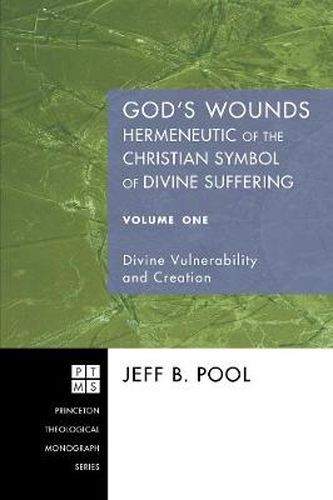Readings Newsletter
Become a Readings Member to make your shopping experience even easier.
Sign in or sign up for free!
You’re not far away from qualifying for FREE standard shipping within Australia
You’ve qualified for FREE standard shipping within Australia
The cart is loading…






This title is printed to order. This book may have been self-published. If so, we cannot guarantee the quality of the content. In the main most books will have gone through the editing process however some may not. We therefore suggest that you be aware of this before ordering this book. If in doubt check either the author or publisher’s details as we are unable to accept any returns unless they are faulty. Please contact us if you have any questions.
This book constitutes the first volume of a three-volume study of Christian testimonies to divine suffering: God’s Wounds: Hermeneutic of the Christian Symbol of Divine Suffering, Divine Vulnerability and Creation. This study first develops an approach to interpreting the contested claims about the suffering of God. Thus, the larger study focuses its inquiry into the testimonies to divine suffering themselves, seeking to allow the voices that attest to divine suffering to speak freely, to discover and elucidate the internal logic or rationality of this family of testimonies, rather than defending these attestations against the dominant claims of classical Christian theism that have historically sought to eliminate such language altogether from Christian discourse about the nature and life of God. Through this approach this volume of studies into the Christian symbol of divine suffering then investigates the two major presuppositions that the larger family of testimonies to divine suffering normally hold: an understanding of God through the primary metaphor of love (God is love); and an understanding of the human as created in the image of God, with a life (though finite) analogous to the divine life–the imago Dei as love. When fully elaborated, these presuppositions reveal the conditions of possibility for divine suffering and divine vulnerability with respect to creation.
$9.00 standard shipping within Australia
FREE standard shipping within Australia for orders over $100.00
Express & International shipping calculated at checkout
This title is printed to order. This book may have been self-published. If so, we cannot guarantee the quality of the content. In the main most books will have gone through the editing process however some may not. We therefore suggest that you be aware of this before ordering this book. If in doubt check either the author or publisher’s details as we are unable to accept any returns unless they are faulty. Please contact us if you have any questions.
This book constitutes the first volume of a three-volume study of Christian testimonies to divine suffering: God’s Wounds: Hermeneutic of the Christian Symbol of Divine Suffering, Divine Vulnerability and Creation. This study first develops an approach to interpreting the contested claims about the suffering of God. Thus, the larger study focuses its inquiry into the testimonies to divine suffering themselves, seeking to allow the voices that attest to divine suffering to speak freely, to discover and elucidate the internal logic or rationality of this family of testimonies, rather than defending these attestations against the dominant claims of classical Christian theism that have historically sought to eliminate such language altogether from Christian discourse about the nature and life of God. Through this approach this volume of studies into the Christian symbol of divine suffering then investigates the two major presuppositions that the larger family of testimonies to divine suffering normally hold: an understanding of God through the primary metaphor of love (God is love); and an understanding of the human as created in the image of God, with a life (though finite) analogous to the divine life–the imago Dei as love. When fully elaborated, these presuppositions reveal the conditions of possibility for divine suffering and divine vulnerability with respect to creation.